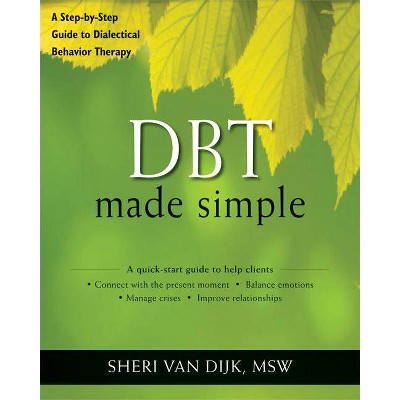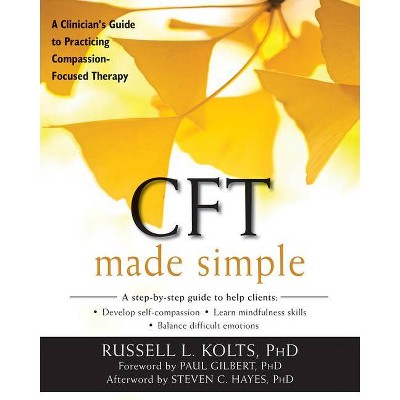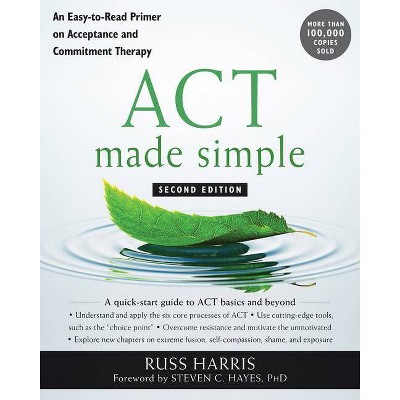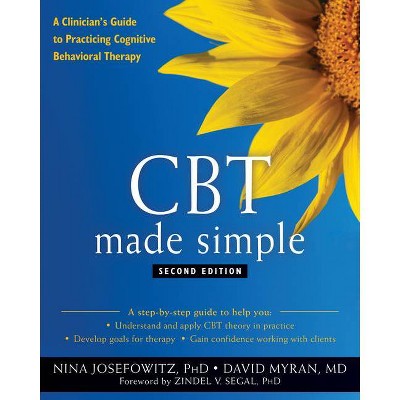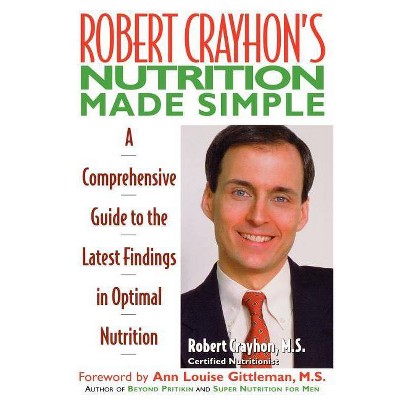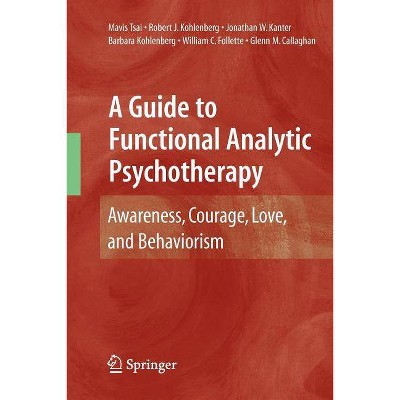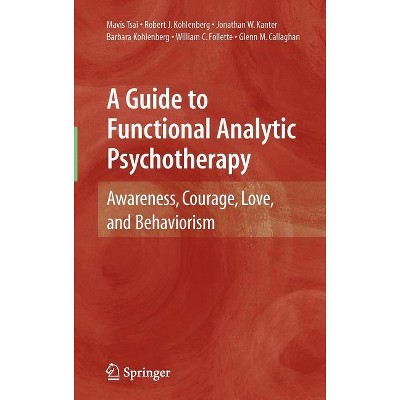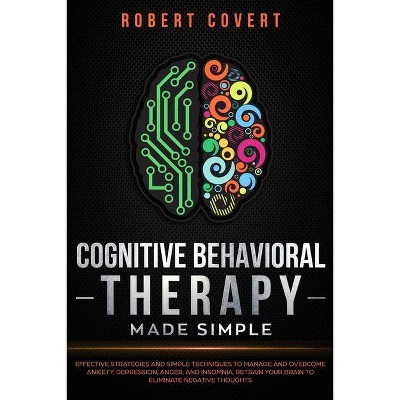Functional Analytic Psychotherapy Made Simple - (New Harbinger Made Simple) by Gareth Holman & Jonathan W Kanter & Mavis Tsai & Robert Kohlenberg
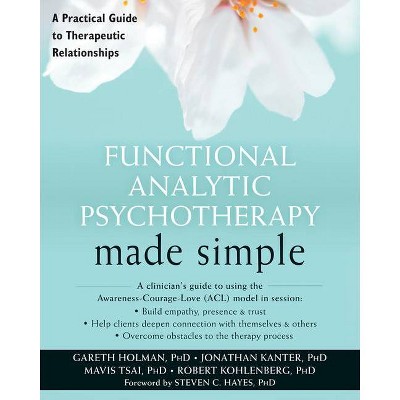
Similar Products
Products of same category from the store
AllProduct info
<p/><br></br><p><b> About the Book </b></p></br></br>How therapists relate to their clients can have a profound impact on treatment outcomes.<i> Functional Analytic Psychotherapy Made Simple</i> is the first professional resource to offer a practical treatment approach focused on interpersonal relationships. Written by the founders of this evidence-based modality, the book integrates the latest research on the importance of the therapist-client relationship with the new science of social connection into a user-friendly, contextual behavioral framework.<p/><br></br><p><b> Book Synopsis </b></p></br></br><b>Cowritten with the founders of functional analytic psychotherapy, <i>Functional Analytic Psychotherapy Made Simple</i> offers a practical, behavioral treatment approach focused on client interpersonal relationships and the therapeutic relationship.</b> <p/> Functional analytic psychotherapy (FAP) is a research-based treatment for mental health disorders and has been shown to enhance the quality of interpersonal relationships. If you're a therapist, how you relate to your clients can have a profound impact on treatment outcomes. This book integrates the latest research on the importance of the therapist-client relationship with the new science of social connection into a user-friendly, flexible clinical framework. <p/> In this book, you'll find an introduction to the conceptual foundations and clinical practice of FAP, with an emphasis on practical clinical scenarios and personal reflection. You'll learn the theoretical basis of FAP in contextual behavioral science and how to apply functional analysis--the core assessment method of behavior therapy--to the therapeutic relationship. You'll learn to understand the therapeutic relationship and social connection in terms of the Awareness, Courage, and Love model. You'll also learn how to balance authenticity and compassion with strategy and case conceptualization to make your therapeutic relationships more compassionate, flexible, and effective. And finally, you'll discover how to apply principles to effectively cope with challenging moments in the therapeutic relationships--such as how to address ineffective behavior happening in the therapy interaction from the first moment of therapy, what to do when therapy does not seem to be progressing, and how to end therapy well. <p/> No matter your treatment background, this book will provide invaluable strategies for adopting functional analytic psychotherapy in your practice, enhancing relationships with your clients, and improving overall treatment outcomes. <br><p/><br></br><p><b> Review Quotes </b></p></br></br><br>"<i>Functional Analytic Psychotherapy Made Simple</i> clearly and elegantly describes an approach that is incredibly useful for therapists and coaches. The authors explain how to consciously create a context that intentionally nurtures growth. The skill of functional analysis can be applied broadly, and this book explains this skill in a way that is easy to understand and apply. Functional analytic psychotherapy (FAP) is about consciously moving into conversation with courage, awareness, and love. This book embodies this beautifully." <br><b>--Rachel Collis</b>, executive coach; MBA lecturer, Queensland University of Technology, Australia<br><br>"After haunting psychotherapy theory for a century, the personal relationship between therapist and client has come to its own as the most powerful tool for therapeutic change. This book explains why and how the personal relationship is essential in the treatment of psychological problems. Seldom has a single volume covered such a broad array of skills and such depths of understanding. Weaving samples of clinical conversation into theory, it makes the complexities of the psychotherapy process--not so much simple, but rather--crystal clear. Its wisdom will cross cultural barriers because it speaks directly to what is at the heart of being human." <br><b>--Luc Vandenberghe</b>, psychotherapist in private practice and faculty member at the Pontifical Catholic University of Goias, Brazil <br><br><br>"As a compassion-focused (CFT) therapist, I've been amazed at how profoundly the FAP training I've received has deepened both my understanding of the therapeutic relationship and my ability to engage in genuine, powerfully collaborative relationships with my clients. In <i>Functional Analytic Psychotherapy Made Simple</i>, these expert authors give us a guide that manages to convey the theory and practice of FAP in a way that is clear and easy to understand without losing any of its precision or subtlety. Filled with clear explanation, demonstrative vignettes, useful clinical tools, and reflective exercises, this wonderfully written book escorts the reader to a nuanced understanding of how to apply a functional-analytic approach to the therapeutic relationship--teaching us to use our most authentic selves as instruments of change and healing, and deepening our understanding of our clients and ourselves as relational beings. <i>Functional Analytic Psychotherapy Made Simple </i>is the perfect introduction to a transformational therapy--highly recommended!" <br><b>--Russell L. Kolts, PhD</b>, professor of psychology at Eastern Washington University, and author of <i>CFT Made Simple</i> and <i>The Compassionate-Mind Guide to Managing Your Anger</i><br><br>"Awareness, courage, and love--these are words that many may instinctively deem 'unprofessional' in the context of psychotherapy. However, in this beautifully written book, readers look through the lens of functional analysis. This therapeutic stance and the activities referred to in this ACL framework are vital to the psychotherapeutic relationship, and lie at the core of FAP. The book will appeal to both those who enjoy a good empirically based model and those who are moved by philosophy--or those who respond to both. Students, new professionals, and clinicians that have been in practice for many years will benefit from the insights and exercises offered in this wonderful book." <br><b>--</b><b>Christopher R. Martell, PhD, ABPP</b>, lecturer and clinic director of the Psychological Services Center at the University of Massachusetts Amherst, coauthor of <i>Overcoming Depression One Step at a Time </i>and <i>Behavioral Activation for Depression</i> <br><br><br>"Countless research studies have shown that one of the most important factors to influence successful treatment outcomes is the therapeutic relationship. There's no intervention more powerful than using the present-moment interaction between client and therapist to experiment with new behaviors and promote behavioral flexibility. This book teaches clinicians how to effectively use the therapeutic relationship as a tool for behavioral change, and is a must-read for every clinician regardless of their theoretical orientation. This book provides practical tools for guiding clinicians on how to use the therapeutic interaction to foster behavioral change; offers specific steps to identify, track, and monitor both client and therapist's targeted behaviors for treatment, and modify them in the moment; and with its many worksheets, exercises, and sample dialogues, this book is the perfect resource for any clinician who wants to help clients build authentic and more fulfilling relationships." <br><b>--Avigail Lev, PsyD</b>, director of the Bay Area CBT Center, and coauthor of <i>Acceptance and Commitment Therapy for Interpersonal Problems</i>, <i>The Interpersonal Problems Workbook</i>, and <i>Acceptance and Commitment Therapy for Couples</i><br><br>"For clinicians who want their therapy relationships to improve their clients' lives, this book is the place to start. A delight to read, <i>Functional Analytic Psychotherapy Made Simple</i> provides a clear and compassionate guide to helping therapists be present, supportive, and responsive to clients. The book is chock-full of vivid clinical examples, tools and worksheets, and helpful solutions for getting unstuck in therapy. The result is an excellent foundation for therapists to develop powerful curative relationships with clients, while being seamlessly grounded in the principles of behaviorism that underlie this therapy. Coming over a quarter century since the seminal book on FAP was released, and distilling the authors' forty-plus years of wisdom and experience, the book is a true achievement. <i>Functional Analytic Psychotherapy Made Simple </i>is destined to become a gem in any clinician's library. I wish I had this book when I first learned FAP many years ago." <br><b>--Jonathan B. Bricker, PhD</b>, behavioral scientist, psychology professor, and practicing FAP therapist <br><br><br>"FAP brings a unique perspective to the art of therapy. Built on a set of simple principles, it can help therapists and clients build unforgettable and transformative relationships. Whatever your approach, FAP can throw new light on the therapeutic process with precise and effective interventions. It's allowed me to work more flexibly with ACT by helping me to focus on present-moment awareness and interpersonal processes. Though its principles are simple, FAP is an exquisitely sensitive treatment approach. It certainly isn't easy. This book achieves the feat of making it simple by laying out FAP's awareness, courage, and love model in a uniquely accessible way. FAP can change your life and that of your clients. I wish I'd had this book eight years ago, when I first started using FAP principles in my clinical practice." <br> --<b>Benjamin Schoendorff</b>, international ACT trainer; director of the Contextual Psychology Institute in Montreal, QC, Canada; and coauthor of <i>The Essential Guide to the ACT Matrix</i> <br><br><br>"Getting training in FAP several years ago was a game changer in my own work, but I wish I had had <i>Functional Analytic Psychotherapy Made Simple</i> as a companion back then. The book perfectly conveys the richness of behavioral principles, and at the same time it takes you, step-by-step, through the process of integrating these principles into your daily practice. It is wonderfully written and inspiring; deep and clear; simple and powerful." <br><b>--</b><b>Matthieu Villatte, PhD</b>, author of <i>Mastering the Clinical Conversation</i> <br><br><br>"This book is absolutely beautifully written in terms of its prose and message. It offers a sound introduction to FAP, with excellent examples and coherent explanations of what FAP deems to be its core foci. It also works well as an extended description and discussion of the core concept of functional analysis, which is sadly missing from the existing literature. I am frequently asked to explain and illustrate functional analysis, and in the future I will be citing this work as the answer. Although it aims to 'make simple, ' the work is also adequately scholarly. It uses an appropriate level of citations, often missing in similar texts, which undermines the credibility of the proposed arguments. The level of detail provided on relevant studies is also perfect for the target audience. At a more general therapeutic level, the book highlights a very comprehensive and thorough understanding of issues central to competent therapeutic work (e.g., closure)." <br><b>--</b><b>Yvonne Barnes-Holmes</b>, associate professor of behavior analysis in the department of experimental clinical and health psychology, and faculty of psychology and educational studies at Ghent University in Belgium<br><br>"This book stays with what has always been the strength of FAP: focus on the therapeutic relationship and functional analysis of that relationship as the central strategy for change. At the same time, it broadens the scope in a way that makes the basic principles more assessable to therapists of different schooling. In short: excellent!" <br><b>--Niklas Törneke, MD</b>, author of <i>Learning RFT</i> and <i>Metaphor in Practice</i>, and coauthor of <i>The ABCs of Human Behavior</i><br><p/><br></br><p><b> About the Author </b></p></br></br><p><b>Gareth Holman, PhD</b>, is a Seattle-based psychologist and consultant. Holman is partner at OpenTeam--a consulting firm that helps business and leadership teams communicate openly and cooperate effectively towards their purpose. His private practice focuses on improving relationships and communication, and he trains and consults with therapists and coaches worldwide who are practicing functional analytic psychotherapy (FAP) and related behavioral therapies. <p/><b>Jonathan Kanter, PhD</b>, received his doctorate in clinical psychology from the University of Washington in 2002. He is currently research associate professor and FAP term professor in the department of psychology at the University of Washington, where he directs the Center for the Science of Social Connection. The center's research focuses on FAP and other interventions based on a contextual-behavioral understanding of social connectedness and intimate relations in areas of public health significance where relationships matter, such as psychotherapy and racism. Kanter is regarded as a leader in research on FAP, and is regularly invited to lecture, provide workshops, and provide consultation on FAP internationally. <p/><b>Mavis Tsai, PhD</b>, is cofounder of FAP, and director of the FAP Specialty Clinic at the University of Washington. Tsai has an international following as a trainer, consultant, and clinician. <p/><b>Robert Kohlenberg, PhD</b>, is cofounder of FAP and professor of psychology at the University of Washington. <p/> Foreword writer <b>Steven C. Hayes, PhD</b>, is Nevada Foundation Professor and director of clinical training in the department of psychology at the University of Nevada. An author of forty-one books and nearly 600 scientific articles, his career has focused on analysis of the nature of human language and cognition, and its application to the understanding and alleviation of human suffering and promotion of human prosperity. Among other associations, Hayes has been president of the Association for Behavioral and Cognitive Therapies, and the Association for Contextual Behavioral Science. His work has received several awards, including the Impact of Science on Application Award from the Society for the Advancement of Behavior Analysis, and the Lifetime Achievement Award from the Association for Behavioral and Cognitive Therapies.</p> <br>
Price History
Cheapest price in the interval: 34.49 on October 28, 2021
Most expensive price in the interval: 34.49 on November 6, 2021
Price Archive shows prices from various stores, lets you see history and find the cheapest. There is no actual sale on the website. For all support, inquiry and suggestion messages communication@pricearchive.us
